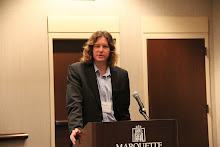Creston Davis has posted on his blog Object Petit a Zizek's introduction to Hegel and the Infinite: Religion, Politics, and Dialectic, edited by Zizek, Crockett, and Davis himself. The introduction is an interesting read mainly concerned with interpreting the way in which Hegelianism itself changed philosophy in such a way as to dismiss the idea that the very existence of post-Hegelianism is a counter argument to Hegel. It ends with the rallying call for us to attempt to read the difficult history of the twentieth century in a Hegelian manner and with the promise that the true time of Hegel will be the twenty-first century. This rather reminds me of Zizek's confession in a recent interview that he is working on a huge book about Hegel which he intends to be his magnum opus.
I think the part of the introduction that most struck me was this paragraph:
In what, then, resides Hegel’s uniqueness? Hegel’s thought stands for the moment of passage between philosophy as Master’s discourse, the philosophy of the One that totalizes the multiplicity, and anti-philosophy which asserts the Real that escapes the grasp of the One. On the one hand, he clearly breaks with the metaphysical logic of counting-for-One; on the other hand, he does not allow for any excess external to the field of notional representations. For Hegel, totalization-in-One always fails, the One is always-already in excess with regard to itself, it is itself the subversion of what it purports to achieve, and it is this tension internal to the One, this Two-ness which makes the One One and simultaneously dislocates it, it is this tension which is the movens of the “dialectical process.” In other words, Hegel effectively denies that there is no Real external to the network of notional representations (which is why he is regularly misread as “absolute idealist” in the sense of the self-enclosed circle of the totality of the Notion). However, the Real does not disappear here in the global self-relating play of symbolic representations; it returns with a vengeance as the immanent gap, obstacle, on account of which representations cannot ever totalize themselves, on account of which they are “non-all.”
Obviously, if you read my blog, you have seen that I have been reading and thinking a lot about Badiou recently. I am interested here in the way in which Zizek picks something out that may indeed be central to Hegel but presents it in a way which sounds far more like Badiou than Hegel.
Subscribe to:
Post Comments (Atom)


This comment has been removed by a blog administrator.
ReplyDelete